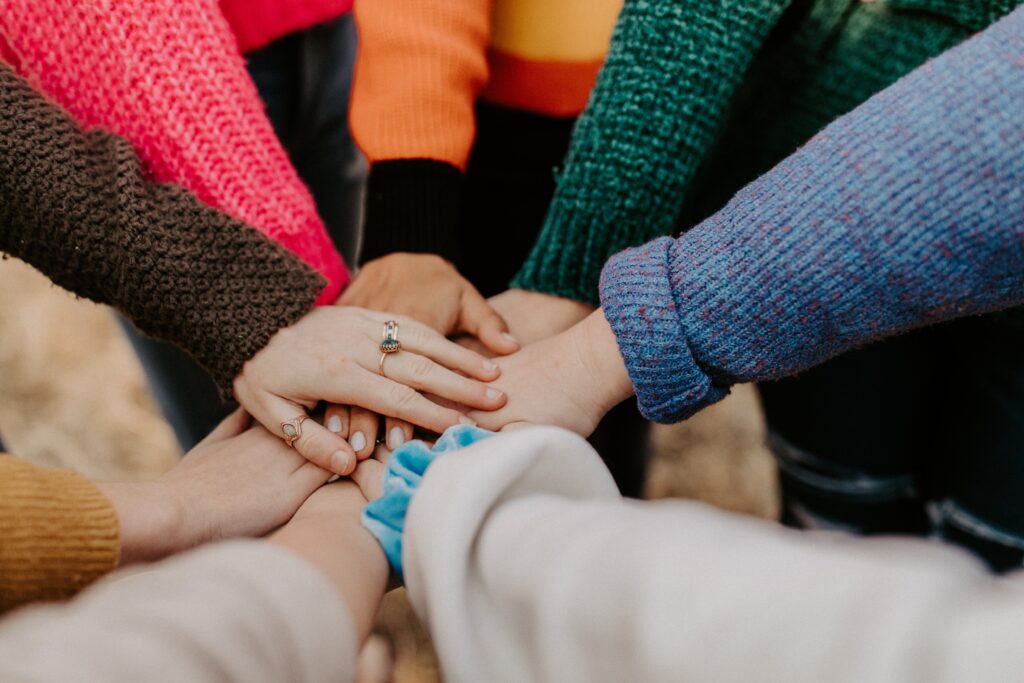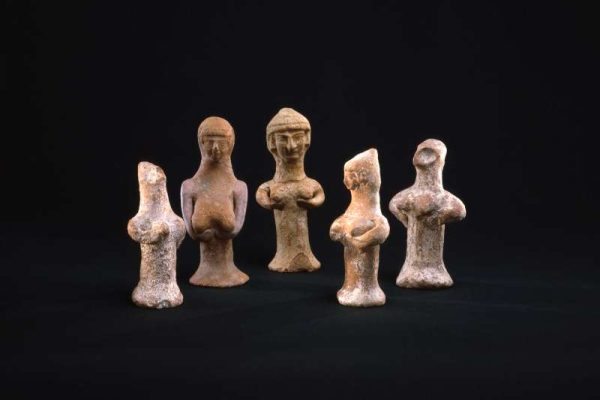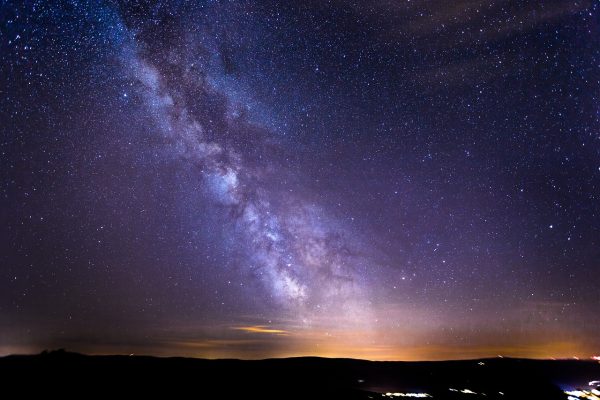Once upon a time, when a boy reached the age of bar-mitzvah, the old men in the synagogue would induct him into the community with herring and schnapps. Nowadays, the bar-mitzvah and bat-mitzvah perform for the assembled crowd, but there is generally no opportunity for the community to welcome the bar-mitzvah or bat-mitzvah into the community and to convey what membership in the community entails.
In preparation for my daughter Neshama’s bat-mitzvah earlier this year [1996], I developed such a ceremony. In this “welcoming ceremony”, the community is represented by a minyanThe group of ten adult Jews needed to read from the Torah and to recite some of the most important communal prayers. In Orthodox communities, a quorum of ten men is traditionally required. Today, most liberal Jewish communities count all Jewish adults as part of a minyan. of ten participants who are close to the bar/bat-mitzvah. Each person reads a paragraph to the bar/bat-mitzvah and may add at the ellipsis (…) a sentence or two (but not more) of personal comments on the theme of the paragraph.
At Neshama’s bat-mitzvah, the ceremony took place during lunch on ShabbatShabbat is the Sabbath day, the Day of Rest, and is observed from Friday night through Saturday night. Is set aside from the rest of the week both in honor of the fact that God rested on the seventh day after creating the world. On Shabbat, many Jews observe prohibitions from various activities designated as work. Shabbat is traditionally observed with festive meals, wine, challah, prayers, the reading and studying of Torah, conjugal relations, family time, and time with friends. following the morning services. The participants in the ceremony were provided with copies of the ceremony several days earlier, and, to some extent, were assigned paragraphs which reflected their own life commitments. We selected ten women to represent the community, but others may prefer to have both men and women participate. The ten people initially formed a semi-circle with Neshama at the center; each person stepped forward to speak and afterwards gave her a welcoming hug (which could be replaced by a handshake). At the conclusion, the semi-circle encircled her and sang siman tov u’mazalGood fortune, luck, and the Hebrew sign of the Zodiac. tov, in which everyone else participated.
I would appreciate hearing from those who use this ceremony, joer@dimacs.rutgers.edu. Needless to say, I anticipate that you will want to modify the text of the ceremony, and it is certainly appropriate to change both language and emphasis to reflect your own commitments and style.
1. Neshama, we are here to welcome you to the adult Jewish community, to tell you about your privileges and your responsibilities. Until now, you weren’t thought of as grown-up, but from now on Judaism treats you as a grown-up, even though none of us, neither you, your parents, or the community, is quite ready for that. It will take a while for you to become an adult, and it will take a while for all of us to recognize you as an adult, but your bat-mitzvah is when this process starts. … Welcome to our community.
2. Neshama, to be part of the Jewish community is to be aware that God has high expectations for you, and also that God has given you the abilities to achieve those expectations. Each of us strives to be the best possible person we can be, to use the talents that God has given to us to create meaningful lives for ourselves, to strengthen our communities, and to make the world a better place. … Welcome to our community.
3. Neshama, to be part of the Jewish community means that you have to take responsibility for your own actions. As you become an adult, you will be making more decisions for yourself, and the kind of person you become, the kind of life that you lead, will depend on those decisions. We recognize that everything that we do has consequences for ourselves, our families, and our community; we therefore take seriously all of our life-choices, and try to make the best choices we can make. … Welcome to our community.
4. Neshama, to be part of the Jewish community means that you accept the Torah’s commandments, the mitzvahLit. Commandment. It is traditionally held that there are 613 mitzvot (plural) in Judaism, both postive commandments (mandating actions) and negative commandments (prohibiting actions). Mitzvah has also become colloquially assumed to mean the idea of a “good deed." in bat-mitzvah. Although we have the ability and the opportunity to do whatever pleases us, we recognize that our own eyes often lead us astray. So we observe a tradition which requires us to set limits, which reminds us of God’s presence, and which keeps us focused on doing God’s will. … Welcome to our community.
5. Neshama, to be part of the Jewish community means that you become a link in the golden chain of Jews that stretches back for three thousand years. Being part of this community means that we commit ourselves to learn about our heritage and to be proud of it; each of us does our part in ensuring that the chain will stretch far into the future. … Welcome to our community.
6. Neshama, to be part of the Jewish community means that you are aware of and participate in the life of the Jewish people. We live by the Jewish calendar, which marks our periods of rejoicing and mourning, our new years, and our turnings. We care deeply about Jews around the world, and are especially attuned to Eretz Yisrael. … Welcome to our community.
7. Neshama, to be part of the Jewish community means that your are aware and participate in the lives of the other members of the community. Each of us is connected to, and responsible for each other. We rejoice at each other’s simchasA happy occasion. Usually describes a celebration for a life cycle event (birth, wedding, etc.)., we mourn each other’s losses, and we are always ready to give each other help or support when it is needed. … Welcome to our community.
8. Neshama, to be part of the Jewish community means that you are especially considerate of those who are different. The TorahThe Five Books of Moses, and the foundation of all of Jewish life and lore. The Torah is considered the heart and soul of the Jewish people, and study of the Torah is a high mitzvah. The Torah itself a scroll that is hand lettered on parchment, elaborately dressed and decorated, and stored in a decorative ark. It is chanted aloud on Mondays, Thursdays, and Shabbat, according to a yearly cycle. Sometimes "Torah" is used as a colloquial term for Jewish learning and narrative in general. tells us over and over that we have to concern ourselves with those who don’t quite fit into the community. We try to make each person feel more welcome, more a part of our community. … Welcome to our community.
9. Neshama, to be part of the Jewish community means that you are tolerant of all people. We remember at each moment that all human beings are created in God’s image, with a spark of the divine, and that other people’s sparks may be different from ours. We recognize that God’s oneness depends on the oneness of all of humanity, and so we strive to bring people together, to work together for a better world for all. … Welcome to our community.
10. Neshama, to be part of the Jewish community means that you remember that the world survives because of acts of justice and kindness tsedakah and g’milut hasadim. Compassion is our heritage, and so at all times we remind ourselves of our responsibilities to other people — to help ensure that they all share in the benefits of our community. … Welcome to our community.
ALL TOGETHER: Neshama, welcome to our community.
Used by permission of the author, who is a professor of mathematics at Rutgers University, a member of the Highland Park (NJ) Minyan, and the author of SiddurLit. Order of prayers. The prayer book. Eit Ratzon (www.newsiddur.org).












